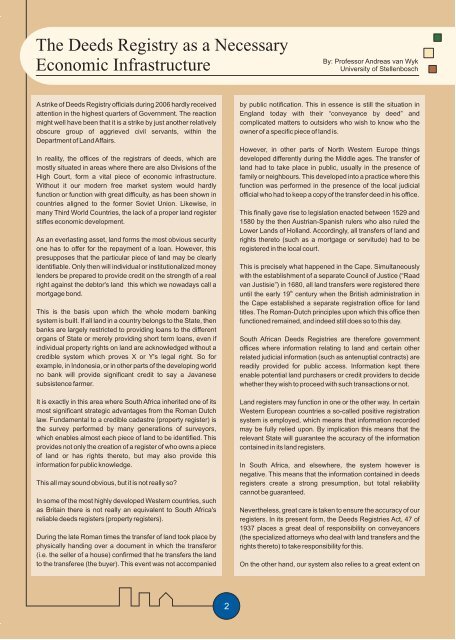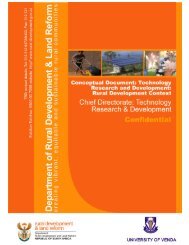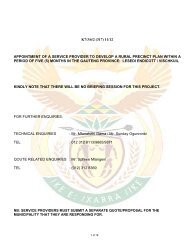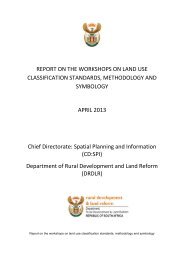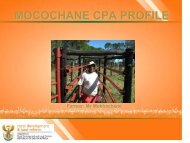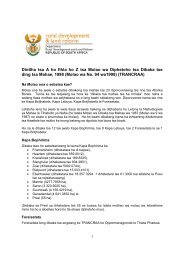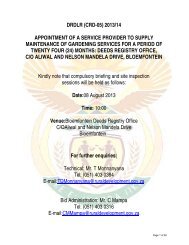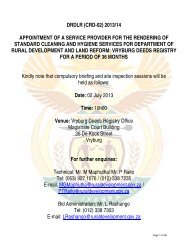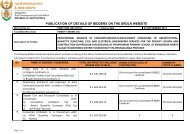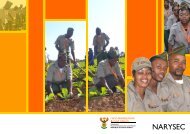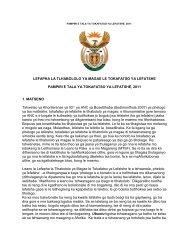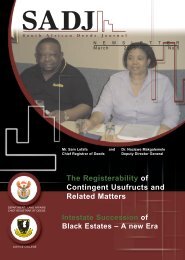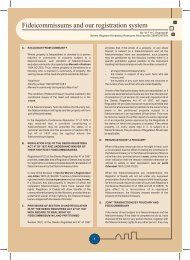South African Deeds Journal
South African Deeds Journal - Department of Rural Development ...
South African Deeds Journal - Department of Rural Development ...
- No tags were found...
You also want an ePaper? Increase the reach of your titles
YUMPU automatically turns print PDFs into web optimized ePapers that Google loves.
The <strong>Deeds</strong> Registry as a Necessary<br />
Economic Infrastructure<br />
By: Professor Andreas van Wyk<br />
University of Stellenbosch<br />
Astrike of <strong>Deeds</strong> Registry officials during 2006 hardly received<br />
attention in the highest quarters of Government. The reaction<br />
might well have been that it is a strike by just another relatively<br />
obscure group of aggrieved civil servants, within the<br />
Department of LandAffairs.<br />
In reality, the offices of the registrars of deeds, which are<br />
mostly situated in areas where there are also Divisions of the<br />
High Court, form a vital piece of economic infrastructure.<br />
Without it our modern free market system would hardly<br />
function or function with great difficulty, as has been shown in<br />
countries aligned to the former Soviet Union. Likewise, in<br />
many Third World Countries, the lack of a proper land register<br />
stifles economic development.<br />
As an everlasting asset, land forms the most obvious security<br />
one has to offer for the repayment of a loan. However, this<br />
presupposes that the particular piece of land may be clearly<br />
identifiable. Only then will individual or institutionalized money<br />
lenders be prepared to provide credit on the strength of a real<br />
right against the debtor's land this which we nowadays call a<br />
mortgage bond.<br />
This is the basis upon which the whole modern banking<br />
system is built. If all land in a country belongs to the State, then<br />
banks are largely restricted to providing loans to the different<br />
organs of State or merely providing short term loans, even if<br />
individual property rights on land are acknowledged without a<br />
credible system which proves X or Y's legal right. So for<br />
example, in Indonesia, or in other parts of the developing world<br />
no bank will provide significant credit to say a Javanese<br />
subsistence farmer.<br />
It is exactly in this area where <strong>South</strong> Africa inherited one of its<br />
most significant strategic advantages from the Roman Dutch<br />
law. Fundamental to a credible cadastre (property register) is<br />
the survey performed by many generations of surveyors,<br />
which enables almost each piece of land to be identified. This<br />
provides not only the creation of a register of who owns a piece<br />
of land or has rights thereto, but may also provide this<br />
information for public knowledge.<br />
This all may sound obvious, but it is not really so?<br />
In some of the most highly developed Western countries, such<br />
as Britain there is not really an equivalent to <strong>South</strong> Africa's<br />
reliable deeds registers (property registers).<br />
During the late Roman times the transfer of land took place by<br />
physically handing over a document in which the transferor<br />
(i.e. the seller of a house) confirmed that he transfers the land<br />
to the transferee (the buyer). This event was not accompanied<br />
by public notification. This in essence is still the situation in<br />
England today with their “conveyance by deed” and<br />
complicated matters to outsiders who wish to know who the<br />
owner of a specific piece of land is.<br />
However, in other parts of North Western Europe things<br />
developed differently during the Middle ages. The transfer of<br />
land had to take place in public, usually in the presence of<br />
family or neighbours. This developed into a practice where this<br />
function was performed in the presence of the local judicial<br />
official who had to keep a copy of the transfer deed in his office.<br />
This finally gave rise to legislation enacted between 1529 and<br />
1580 by the then Austrian-Spanish rulers who also ruled the<br />
Lower Lands of Holland. Accordingly, all transfers of land and<br />
rights thereto (such as a mortgage or servitude) had to be<br />
registered in the local court.<br />
This is precisely what happened in the Cape. Simultaneously<br />
with the establishment of a separate Council of Justice (“Raad<br />
van Justisie”) in 1680, all land transfers were registered there<br />
th<br />
until the early 19 century when the British administration in<br />
the Cape established a separate registration office for land<br />
titles. The Roman-Dutch principles upon which this office then<br />
functioned remained, and indeed still does so to this day.<br />
<strong>South</strong> <strong>African</strong> <strong>Deeds</strong> Registries are therefore government<br />
offices where information relating to land and certain other<br />
related judicial information (such as antenuptial contracts) are<br />
readily provided for public access. Information kept there<br />
enable potential land purchasers or credit providers to decide<br />
whether they wish to proceed with such transactions or not.<br />
Land registers may function in one or the other way. In certain<br />
Western European countries a so-called positive registration<br />
system is employed, which means that information recorded<br />
may be fully relied upon. By implication this means that the<br />
relevant State will guarantee the accuracy of the information<br />
contained in its land registers.<br />
In <strong>South</strong> Africa, and elsewhere, the system however is<br />
negative. This means that the information contained in deeds<br />
registers create a strong presumption, but total reliability<br />
cannot be guaranteed.<br />
Nevertheless, great care is taken to ensure the accuracy of our<br />
registers. In its present form, the <strong>Deeds</strong> Registries Act, 47 of<br />
1937 places a great deal of responsibility on conveyancers<br />
(the specialized attorneys who deal with land transfers and the<br />
rights thereto) to take responsibility for this.<br />
On the other hand, our system also relies to a great extent on<br />
2


